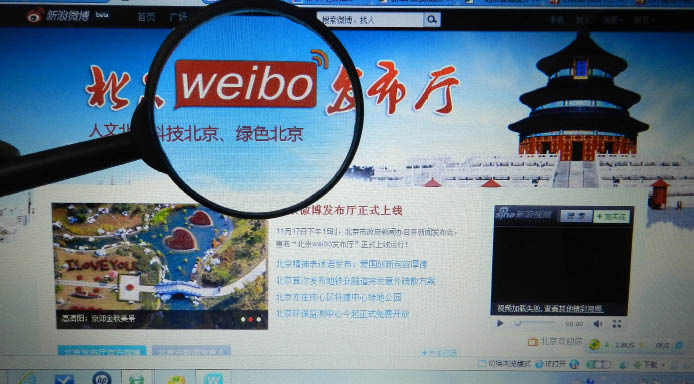|
E-Government: Open, Approachable Government Websites
By XUE SONGYAN
REFORM of administrative structures and innovation in social management have been integral to China's reform and opening-up. At their core has been a transformation of the government's role from administrative bureaucracy to service provider.
The Internet, as a relatively new form of media readily accessible to the public, has given impetus to this transformation process. Especially in governmental realms, websites have encouraged openness and transparency. With the click of a mouse, people can read all about budgets, leave comments and opinions, and participate in the formulation of policy. This has boosted confidence in government itself.
Last February, a Chinese student was detained in Manila Airport in the Philippines. A Chinese man at the scene sent out the news on Weibo – a twitter-like microblogging service. Four hours later, "Diplomatic Smarts," the official Weibo account of the Ministry of Foreign Affairs of the PRC, made its first response: "Upon reading about the detainment on Weibo, Diplomatic Smarts immediately contacted the Chinese embassy in the Philippines, which sent a consular official to the airport. It turned out that the student was denied entrance to the country because of incomplete arrival documentation. The consular official is helping secure his entry."
|
 |
| When on November 17, 2011, the Beijing Weibo Press Release Hall went online on sina.com.cn, a total of 20 Beijing municipal administrative departments joined in. CFP |
Ten minutes later "Diplomatic Smarts" sent out another piece of information – the mobile phone number of the responsible consular official. Travelers were advised to call the number in case of emergencies in the Philippines. Other telephone numbers of Chinese institutions in the country were also given. The posting of this information was lauded by netizens as a great example of prompt government response. Microblogs like Weibo in particular have become indispensable in helping the public exercise their rights to supervise, learn about and participate in the administration of public affairs.
In March 2010, the State Council announced that government expenditures on receptions, transportation and overseas travel would be detailed for the first time in the June central financial report to the Standing Committee of the National People's Congress – a document available for anyone to read. By August 2010 almost all 98 departments and ministries of the central government had laid bare their expenditures to the public, the exceptions being those working with state secrets. This release of expenditure data drew considerable public attention and sparked heated debate.
Since the central government launched its government website project in 1999, the web presence of ministries and commissions of the State Council and local governments has rapidly developed. Originally focused on gaining an online presence, by 2010 government websites had set about reinventing themselves as interactive portals through which information and services are shared freely. The goal is the same as always – openness and transparency, but the platform is greatly improved.
Through cloud computing and mobile internet technologies, the authorities are now vastly better equipped to deal with pressing issues, accidents and fact correction. Websites offer a direct line to the people – important government information, when released, goes straight to those it affects.
Immediate and Effective
Compared to traditional media, websites are able to respond quickly to incidents and convey information to a large audience immediately and effectively. This affords websites an invaluable role in coping with emergencies.
Information cannot be suppressed, especially if it concerns dangerous or controversial incidents. If information is withheld from the public, the Internet usually plays the role of whistleblower, although the reliability of online sources then comes into question. Wu Heping, press spokesman of the Ministry of Public Security, summarized the point eloquently: "If the truth is withheld, rumors arise; if a major thoroughfare is blocked, small back roads teem with dangerous amounts of traffic."
Many government websites have become proficient at coping with situations that require rapid responses from the authorities. A number of examples prove the point.
When SARS was rampant in 2003, local authorities throughout China were forced to carry out extensive quarantine procedures. This had the effect of stifling the flow of information, especially when traditional media coverage of SARS was sparse domestically.
At the time of the outbreak, the Wuhu municipal government in Anhui Province had just launched its website. The authorities quickly recognized the value of their web presence, and began posting regular updates on SARS on their homepage and encouraged citizens to share breaking news on the site. After the SARS panic subsided, the Wuhu municipal government website remained a popular information-sharing forum for residents.
| 